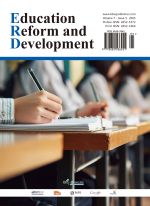Abstract
The integration of information technology in education has the potential to bridge disparities in educational resources across different regions. This study examines the application of the Technological Pedagogical Content Knowledge (TPACK) framework in high school physics teaching, with a particular focus on its role in addressing regional disparities in educational resources in China. A quasi-experimental design was conducted in Anyang County High School, where two classes received TPACK-based instruction while two control classes followed traditional teaching methods. Data were collected through pre- and post-intervention questionnaires assessing classroom environment, technology integration, learning experiences, and learning outcomes, alongside physics test scores. Results indicate that TPACK-based teaching significantly improved students’ engagement, classroom interaction, and conceptual understanding of physics. The use of digital tools facilitated access to high-quality educational resources, reducing the impact of regional disparities in teacher expertise and instructional quality. Teachers in the experimental group demonstrated enhanced technological proficiency, enabling them to integrate technology into pedagogy more effectively. These findings suggest that implementing the TPACK framework can serve as a viable strategy to narrow the educational gap by enhancing teaching quality in under-resourced schools. However, further efforts are needed to provide targeted teacher training and optimize the integration of technology into instructional design. This study offers valuable insights into the role of technology in promoting equitable access to quality physics education.
References
Jiang D, Men H, Kong F, et al., 2016, Development Status of Educational Informatization and Policy Suggestions for the “13th Five-Year Plan”. China Educational Informatization, 2016(1): 14–18.
Lu Y, Zhang R, 2023, A Review of Online Learning Research at Home and Abroad in the Past Decade: A Visual Analysis Based on CiteSpace. Adult Education, 43(6): 47–58.
Liang X, 2024, Educational Inequalities Due to Regional Differences in China, Exemplified by Yunnan and Guangdong Provinces: An Analysis Based on Socio-economic, Cultural Context and Policy Factors. Communications in Humanities Research, 49: 6–11.
Meng X, 2023, Analysis of the Issues and Countermeasures in Integrating Information Technology with Middle School Physics Teaching. Xue Zhoukan, 2023(19): 58–60.
Mishra P, Koehler M, 2006, Technological Pedagogical Content Knowledge: A Framework for Teacher Knowledge. Teachers College Record, 108(6): 1017–1054.
Zhan Y, Ren Y, 2010, A Brief Overview of the Connotation and Research Status of Integrated Technology-Based Subject Teaching Knowledge. Journal of Distance Education, 28(4): 78–87.
Iskandar D, 2022, Integration of Technological Pedagogical Content Knowledge (TPACK) Learning Methods in the Learning Management System as an Effort to Improve Educator Competence. JTP–Jurnal Teknologi Pendidikan, 24(3): 389–399.
Hu S, Xue Y, 2006, Classification and Learning of Physics Knowledge. Journal of Hexi University, 2006(2): 107–109.
Ma L, 2012, A Discussion on the Holistic and Systematic Design of Unit Teaching. Curriculum, Textbooks & Teaching Methods, 32(2): 23–31.
Robertson T, 2008, When Outcomes Attack: Technology Introduction Decisions Focusing on Results Instead of Uses Through the TPACK Educator Knowledge Model. Society for Information Technology & Teacher Education International Conference, Association for the Advancement of Computing in Education (AACE): 2217–2222.
Wu H, Ding J, Yu S, 2012, Current Status and Development Trends of Research on Integrated Technology-Based Subject Teaching Knowledge (TPACK). Journal of Distance Education, 30(6): 94–99.
Niess M, 2018, Introduction to Teachers' Knowledge-of-Practice for Teaching With Digital Technologies: A Technological Pedagogical Content Knowledge (TPACK) Framework. Teacher Training and Professional Development: Concepts, Methodologies, Tools, and Applications: 145–159.
Lee S, 1986, Knowledge Growth in Teaching. Educational Researcher, 15(2): 4–14.
Putri A, Juandi D, Jupri A, et al., 2024, Mastering the TPACK Framework: Innovative Approaches by Mathematics Teachers. Jurnal Elemen, 10(3): 582–594.
Kelly M, 2014, Bridging Digital and Cultural Divides: TPCK for Equity of Access to Technology. Handbook of Technological Pedagogical Content Knowledge (TPCK) for Educators, Routledge: 41–68.
Joshi A, Kale S, Chandel S, et al., 2015, Likert Scale: Explored and Explained. British Journal of Applied Science & Technology, 7(4): 396.
